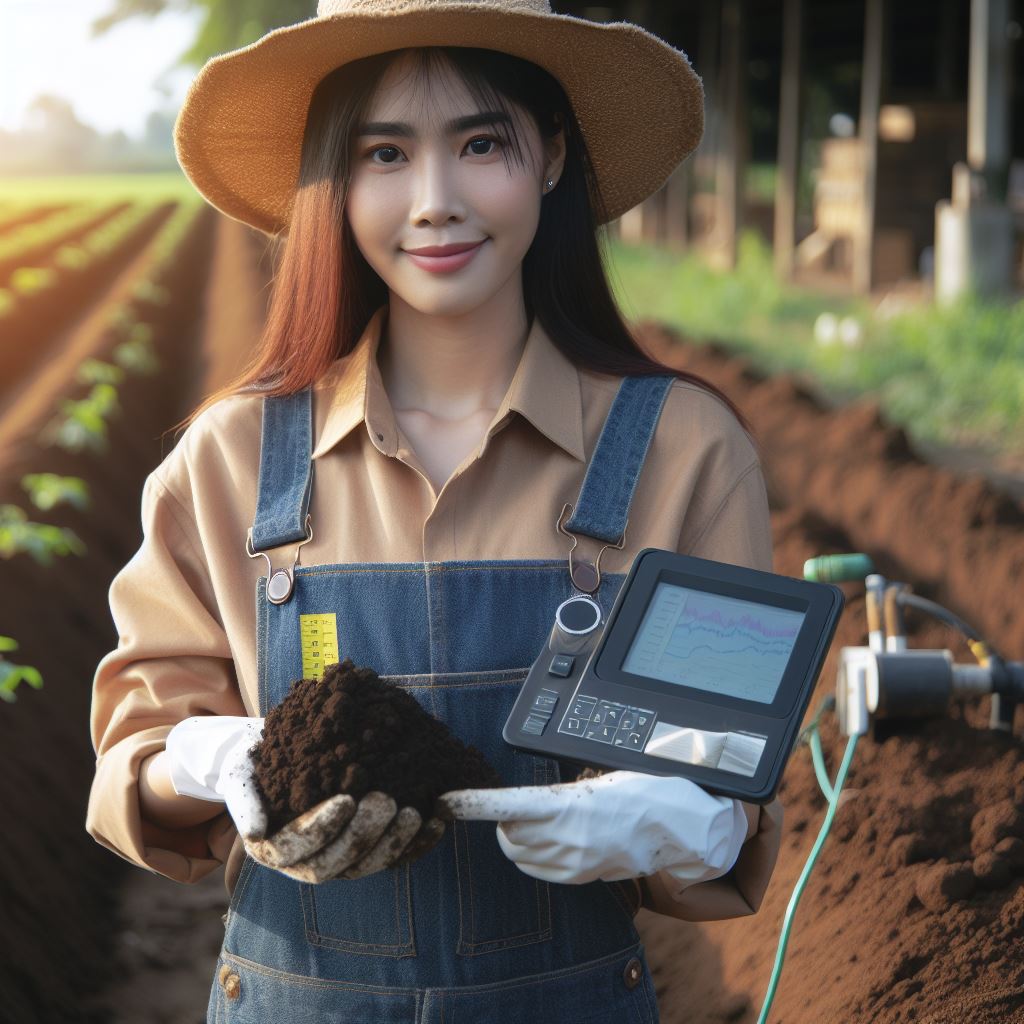Introduction
Farming is an essential industry as it provides food and contributes to the economy.
However, traditional pest control methods have often resulted in adverse effects on the environment.
This is where eco-friendly pest control steps in – it offers a sustainable and safe solution to tackle this issue.
Eco-friendly pest control involves implementing methods that are less harmful to the environment, wildlife, and human health.
It aims to target pests while ensuring minimal impact on other organisms in the ecosystem.
By using natural, organic, and non-toxic techniques, farmers can protect their crops and maintain a healthy environment for future generations.
The purpose of this blog post is to raise awareness about the importance of eco-friendly pest control in farming practices.
It serves as a guide for farmers who are searching for alternative methods to protect their crops without causing harm to the environment.
Moreover, it emphasizes the long-term benefits of adopting eco-friendly pest control techniques, such as the preservation of biodiversity and the reduction of pesticide residue in harvested food.
In the following sections of this blog post, we will dive deeper into specific eco-friendly pest control methods, their benefits, and practical tips for implementation.
By learning and implementing these methods, farmers can contribute to sustainable agriculture and safeguard the earth for generations to come.
The Negative Impacts of Conventional Pest Control Methods
Harmful effects on the environment
Conventional pest control methods involve the use of chemical pesticides, which can have detrimental effects on the environment. These chemicals often find their way into the soil, water sources, and air, contaminating ecosystems.
These pesticides can cause soil degradation, leading to reduced fertility and nutrient imbalance. This can disrupt the natural balance of microorganisms, insects, and plants within the soil, affecting crop growth.
When pesticides seep into water bodies, they can harm aquatic life and contaminate drinking water sources. The chemicals can accumulate in the bodies of fish and other organisms, leading to bioaccumulation and biomagnification up the food chain.
Furthermore, chemical pesticides can also drift through the air and harm non-target organisms. Birds, bees, butterflies, and other beneficial insects may suffer from the toxic effects, potentially leading to population decline and disruption of pollination.
Transform Your Agribusiness
Unlock your farm's potential with expert advice tailored to your needs. Get actionable steps that drive real results.
Get StartedAdverse effects on human health
Conventional pest control methods pose risks to human health, particularly to farmers and agricultural workers who handle these chemicals regularly. Exposure to chemical pesticides can lead to acute and chronic health issues.
Short-term exposure can result in symptoms such as headaches, dizziness, nausea, and respiratory problems. Pesticide residues on crops can also contaminate food, posing a risk to consumers.
Long-term exposure to pesticides has been linked to serious health conditions such as cancer, reproductive disorders, neurological problems, and hormonal imbalances. Pregnant women, children, and the elderly are particularly vulnerable to these health risks.
Even people living near agricultural fields may be exposed to pesticide drift, inhaling toxic chemicals and experiencing health consequences.
Negative impact on biodiversity
Conventional pest control methods often target specific pests, but they can also harm beneficial insects, birds, and other wildlife. This can disrupt ecological balance and lead to biodiversity loss.
Chemical pesticides can eliminate or harm pollinators like bees and butterflies, essential for the reproduction of many plant species. This could result in reduced crop yields and negatively impact food production.
Pesticides also affect natural predators of pests, such as birds and insects, leading to an increase in pest populations over time. This creates a cycle of dependence on chemical pesticides, ultimately further harming the ecosystem.
Biodiversity loss affects the overall stability of ecosystems, making them more vulnerable to invasive species and reducing resilience to environmental stresses such as climate change.
In essence, conventional pest control methods have several negative impacts on the environment, human health, and biodiversity.
It is crucial to shift towards eco-friendly pest control practices in farming to minimize these harmful effects.
Benefits of Eco-Friendly Pest Control Practices
Environmentally sustainable solutions
Eco-friendly pest control practices in farming offer a range of benefits that go beyond simply eradicating pests. One of the primary advantages of such methods is their commitment to environmental sustainability.
Unlike traditional pest control methods that rely on harmful chemicals, eco-friendly practices prioritize an organic and natural approach to pest management.
- By using environmentally sustainable solutions, farmers can effectively combat pests while minimizing their negative impact on the ecosystem.
- These solutions often employ alternative, eco-friendly substances that are less toxic to the environment and have little to no residual effects.
- Implementing eco-friendly pest control practices ensures better long-term soil health, reduces pollution, and supports overall ecosystem balance.
- The use of organic alternatives also helps to maintain the quality and fertility of the soil, promoting healthier crop growth in the long run.
Reduced chemical usage
One of the most significant advantages of eco-friendly pest control in farming is the reduced reliance on chemical pesticides.
Conventional pest control methods often involve the heavy usage of synthetic chemicals that can have detrimental effects on human health and the environment.
- Eco-friendly pest control practices aim to reduce or eliminate the need for chemical pesticides through various alternative techniques
. - Integrated Pest Management (IPM) is a commonly used eco-friendly approach that emphasizes preventive measures, biological controls, and cultural practices to manage pests.
- By adopting IPM and other eco-friendly techniques, farmers can minimize their chemical use, thereby reducing potential environmental contamination.
- Moreover, reduced chemical usage contributes to improved food quality and safety as residues of toxic chemicals on crops and in the soil are significantly reduced.
Preservation of beneficial insects and wildlife
Eco-friendly pest control practices not only focus on eradicating harmful pests but also prioritize the preservation of beneficial insects and wildlife.
Conventional pesticide usage often kills off these beneficial organisms, causing disruptions in the ecological balance and leading to detrimental consequences for crop production.
- Eco-friendly practices aim to maintain the natural predators of pests, such as ladybugs, spiders, and birds, by minimizing their exposure to harmful chemicals.
- By preserving these beneficial insects and wildlife, farmers can harness the power of natural pest control, reducing the reliance on synthetic chemicals.
- This approach promotes a more sustainable and balanced farming ecosystem, where pest populations can be regulated naturally without excessive interference.
- Preserving beneficial insects also aids in pollination, which is crucial for the reproductive success of many crops.
In fact, eco-friendly pest control practices in farming offer significant benefits. They promote environmentally sustainable solutions, reduce chemical usage, and prioritize the preservation of beneficial insects and wildlife.
By adopting these methods, farmers can contribute to a healthier ecosystem, improved crop quality, and a more sustainable agricultural future.
Read: Cover Crops: Advantages in Crop Management

Effective Eco-Friendly Pest Control Techniques
Effective pest control in farming is crucial for ensuring crop yield and minimizing damage caused by pests. However, it is equally important to adopt eco-friendly methods that do not harm the environment or human health.
In this section, we will discuss various techniques of eco-friendly pest control that can be implemented in farming practices.
Biological control methods
Biological control methods involve the use of natural predators or organisms to control pest populations. This method is highly sustainable and eco-friendly as it does not involve the use of harmful chemicals.
Introduction of natural predators
By introducing natural predators such as ladybugs, spiders, or birds into the farming ecosystem, farmers can effectively control pest populations.
These predators feed on pests, thereby reducing their numbers naturally.
Showcase Your Farming Business
Publish your professional farming services profile on our blog for a one-time fee of $200 and reach a dedicated audience of farmers and agribusiness owners.
Publish Your ProfileUtilizing pest-repelling plants
Certain plants, known as pest-repelling plants, emit substances that repel pests. Interplanting these plants with the main crop can deter pests from infesting the crops.
For example, marigold plants can repel aphids when grown alongside vegetables.
Cultural control practices
Cultural control practices involve modifying farming practices to create an environment that is less favorable for pests. This method focuses on preventing pest infestations through various cultural practices.
Crop rotation
Crop rotation is the practice of growing different crops in a sequential manner on the same land.
This helps disrupt the pest life cycle, as pests specific to a particular crop will not find a suitable host during the rotation.
It also improves soil health and nutrient availability.
Mulching and proper irrigation
Mulching involves covering the soil around the plants with organic materials like straw or leaves.
This helps conserve moisture and suppress weed growth. Proper irrigation techniques, such as drip irrigation, ensure that plants receive adequate water without creating excessive moisture that attracts pests.
Mechanical control methods
Mechanical control methods rely on physical barriers or devices to control pests. These methods are effective, inexpensive, and have minimal impact on the environment.
Traps and barriers
Using traps, such as pheromone traps, sticky traps, or light traps, can help capture and monitor pest populations. Physical barriers, such as nets or fences, can be used to prevent pests from reaching the crops.
Physical removal of pests
Regular inspection and manual removal of pests, such as handpicking or vacuuming, can help control their populations. This method is especially effective for larger pests like snails or caterpillars.
By implementing these eco-friendly pest control techniques in farming, farmers can effectively manage pest populations while protecting the environment and maintaining the long-term sustainability of their agricultural practices.
Read: Effective Weed Control in Crop Cultivation
Case Studies of Successful Eco-Friendly Pest Control Implementation
Implementing eco-friendly pest control methods in farming is not just a theoretical concept; it has been successfully practiced in various agriculture settings.
Let’s explore two case studies that demonstrate the effectiveness and benefits of such approaches.
Example 1: Organic vegetable farm
An organic vegetable farm situated in the heart of a rural community decided to adopt eco-friendly pest control methods to maintain the health of their crops.
Instead of resorting to chemical pesticides, they embraced the use of beneficial insects as a natural solution.
Utilizing beneficial insects as a method for pest control
The farm introduced ladybugs, lacewings, and parasitic wasps to combat pests such as aphids, caterpillars, and mites. These insects act as natural predators, keeping the pest populations in check.
Observation of positive results and numerous benefits associated with this approach
The introduction of beneficial insects led to a remarkable decrease in pest infestation. The farm reported healthier crops, increased yield, and reduced economic losses.
Additionally, the farming community also experienced a safer environment without the risks associated with chemical pesticides.
Example 2: Integrated pest management in a vineyard
A vineyard owner in a renowned wine-producing region embarked on implementing an integrated pest management (IPM) approach to ensure the sustainability of their vineyard while minimizing the impact on the ecosystem.
Implementing a combination of natural predators and cultural practices for effective pest control
The vineyard implemented strategies such as planting cover crops, using pheromone traps, and releasing predatory insects like praying mantises and spiders.
These measures aimed to create a balance in the ecosystem, preventing specific pests from becoming dominant while minimizing harm to beneficial insects.
Achievement of positive outcomes and significant increase in overall sustainability
The implementation of IPM led to a significant reduction in the need for chemical pesticides, resulting in cost savings. Moreover, the vineyard witnessed increased biodiversity with thriving populations of beneficial insects.
The overall quality of the grapes improved, positively impacting the winemaking process.
Both these case studies illustrate that eco-friendly pest control methods can be practical and effective in real-life farming scenarios.
By utilizing beneficial insects or implementing integrated pest management, farmers can achieve pest control while also promoting environmental sustainability.
It is crucial for farmers to realize that eco-friendly pest control methods are not only beneficial for their crops but also for their financial stability and the overall ecosystem.
Embracing these approaches not only contributes to the well-being of the farm but also to the health and well-being of the surrounding communities.
Read: Drip Irrigation: Saving Water in Crop Fields
Challenges and Considerations for Implementing Eco-Friendly Pest Control
Transitioning from conventional methods
- Farmers may face difficulties in shifting from traditional pest control practices to eco-friendly alternatives.
- Adapting to new processes and techniques requires education and training for farmers.
- Transitioning can be a gradual process to ensure a smooth implementation of eco-friendly pest control measures.
- Resistance from farmers who are skeptical about the effectiveness of eco-friendly pest control methods may arise.
- Awareness campaigns and outreach programs can help in promoting the benefits and feasibility of eco-friendly approaches.
Crop-specific considerations
- Different crops may require tailored pest control strategies, presenting a challenge in implementing standardized eco-friendly methods.
- Understanding the specific pests for each crop is necessary to develop targeted and effective eco-friendly solutions.
- Proper identification of pests and their life cycles is crucial for the successful implementation of eco-friendly pest control.
- Some crops may have limited options for eco-friendly pest control, necessitating extensive research for suitable alternatives.
- Integration of multiple pest control methods, such as biological controls and cultural practices, may be necessary for optimal results in diverse crops.
Cost implications and potential economic impacts
- Implementing eco-friendly pest control may require initial investments in infrastructure and training, posing financial challenges for farmers.
- Higher upfront costs can deter farmers from adopting eco-friendly approaches, especially when they perceive conventional methods as simpler and cheaper.
- However, long-term benefits such as reduced pesticide use and improved crop quality can offset the initial costs.
- Market demand for environmentally-friendly produce can provide economic incentives for farmers to invest in eco-friendly pest control.
- Government subsidies and support programs can help alleviate the financial burden and encourage the adoption of eco-friendly practices.
Essentially, implementing eco-friendly pest control in farming comes with its fair share of challenges and considerations. Transitioning from conventional methods requires education and awareness campaigns, along with gradual implementation.
Crop-specific considerations demand tailored strategies, proper pest identification, and integration of different control methods.
Lastly, cost implications and economic impacts need to be carefully assessed, with the potential for long-term benefits and government support playing a significant role.
Despite these challenges, the adoption of eco-friendly pest control is vital for sustainable agriculture and the preservation of our ecosystems.
Read: Soil pH and Its Impact on Crop Growth
Conclusion
Eco-friendly pest control in farming is crucial for the health of the environment and consumers.
It is paramount for sustainable agriculture. Traditional chemical pesticides pose environmental risks, harming beneficial organisms and contaminating soil and water.
Adopting eco-friendly alternatives, such as biological control methods or natural repellents, ensures minimal ecological impact. This approach preserves biodiversity, safeguards natural resources, and promotes long-term soil health.
Additionally, eco-friendly pest control reduces the risk of pesticide residues in crops, ensuring food safety for consumers.
Embracing these practices not only protects the environment but also contributes to the overall resilience and viability of agricultural ecosystems, fostering a harmonious balance between farming and nature.
Showcase Your Farming Business
Publish your professional farming services profile on our blog for a one-time fee of $200 and reach a dedicated audience of farmers and agribusiness owners.
Publish Your ProfileFarmers should be encouraged to adopt sustainable practices that prioritize the use of natural pest control methods.
It is essential to continue researching and educating ourselves on eco-friendly pest control to further improve farming practices.




